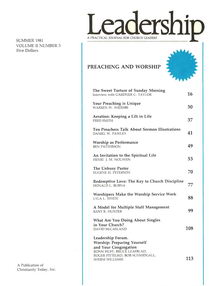Too many people don’t know how to handle money. I remember a survey that asked this question: “How much more income would you need to be comfortable?” The across-the-board answer was 20 percent.
Most of us feel we have a need for more. A pastor should be sensitive to this, whether counseling an engaged couple or an established family about to relocate. Since financial counseling TV a p pastor should be preventive, I’ve used six principles to help people stay free from the bondage of indebtedness.
1. Learn contentment. God isn’t against having things Paul told Timothy that God made all things for us to enjoy. The problem is that until we’re content with what we have, we won’t properly enjoy new things.
2. Learn to fight extravagance. I enjoy a meal in a restaurant, but try not to overdo it. A new couple came to our church, and my wife and I took them to lunch one day. We had clipped some two-forone coupons from the newspaper, so we asked the couple, “Would you mind if we use these coupons for this particular restaurant? We’re trying to maintain a lifestyle that makes us conscious of how we spend money.” That incident deeply impressed this couple, and they’ve mentioned to us that it provided a model for their own lifestyle.
3. Practice saying, “I can’t afford it.” This doesn’t mean you don’t have money It simply means that according to your priorities, you can’t afford it. There are subtle pressures that cause us to want to buy things we normally wouldn’t buy. Friends take trips or buy new cars or vacation cabins. If we do the same things just to keep up with them, we’ve lost our priorities for spending money.|
4. Resolve to pay cash. Plastic money (credit 1 cards) can bury you in debt. I ask my parishioners, l “When you shop, do you spend more if you pay l cash or if you use plastic money?” Invariably they | say they spend less, and spend it more carefully, ] paying cash. One young couple I counseled was in their twenties and in school. They had a normal school debt, a very small car-and plastic money Although their income was less than $l,()()() a month, they ended up $10,000) in debt.
5. Turn potential finance charges into savings. Everyone knows it’s important to save; the problem is finding the money to do it. Watch for an expenditure that could be turned into savings. If you know you’ll need to repair or replace an item such as an appliance, discipline yourself to save up that money for several months. By paying cash, you can save the interest you would have been charged
6. Be a generous giver to God. My wife and 1 came from poor but giving families. To our amazement, both parents in their later years not only had enough to live on, they even left us a modest inheritance.
The writer of Ecclesiastes says, “Whoever loves money never has money enough; whoever lo es wealth is never satisfied with his income.”
Donald L. Bubna, co-pastor
Salem Alliance Church
Salem, Oregon
Copyright © 1981 by the author or Christianity Today/Leadership Journal. Click here for reprint information on Leadership Journal.









